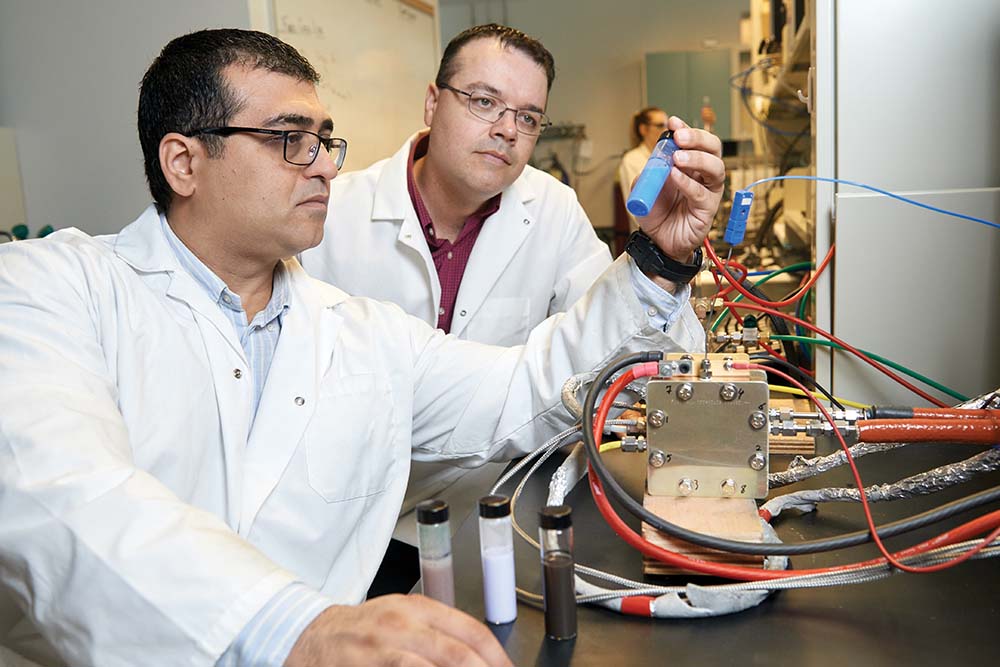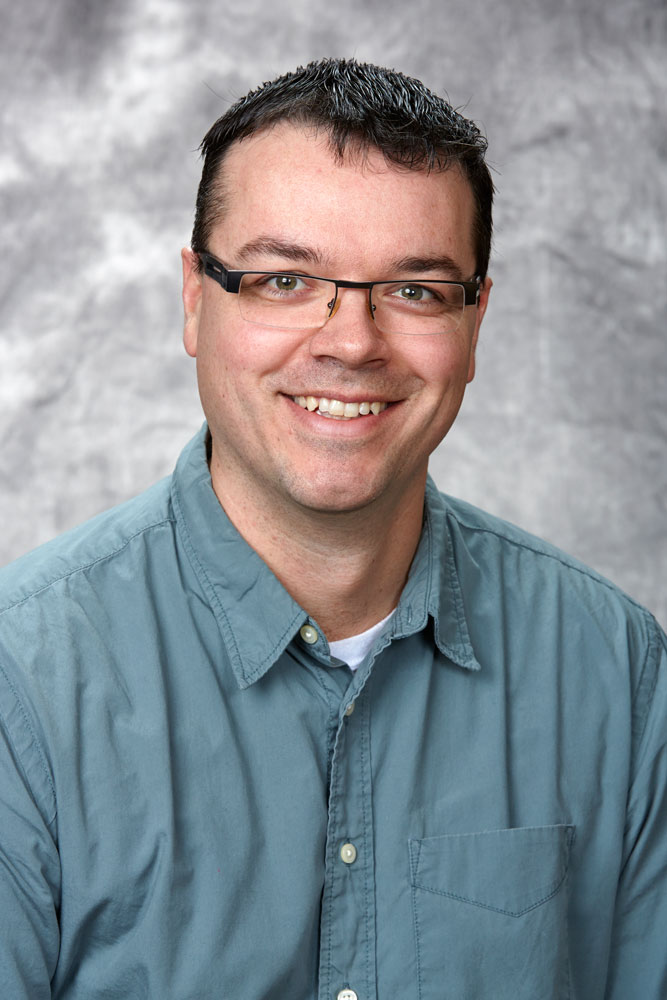Ontario Tech one of five Ontario post-secondary institutions uniting to establish Environmental and Related Technologies Hub (EaRTH)
‘EaRTH District’ will advance climate action solutions in the eastern GTA
October 28, 2021

As the global climate crisis accelerates, Ontario Tech University, Centennial College, University of Toronto Scarborough, Durham College and Trent University have joined together to advance clean, green, sustainable solutions, such as net-zero vertical farming and technology to reverse groundwater pollution.
The Environmental and Related Technologies Hub (EaRTH District) will be dedicated to fueling sustainable, resilient communities locally and around the world. EaRTH District will develop the eastern Greater Toronto Area’s sustainable technology sector through research, academic programming and commercialization of advanced technology.
An EaRTH-commissioned study projects the district to generate $8.4 billion in total direct cumulative output, $1 billion in taxes and more than 4,000 jobs over the next two decades*.
"Given the state of our environment, the situation requires immediate action that can only be solved with the greatest minds working together – which we have right here," says Andrew Arifuzzaman, EaRTH spokesperson and Chief Administrative Officer at University of Toronto, Scarborough. "Collaboration among the five post-secondary institutions working on solutions amplifies the effort exponentially. It's time for us to contribute on a global level and EaRTH is the gateway to doing so."
The consortium seeks to work with the public and private sectors, as well as Indigenous communities, to develop EaRTH District.
Collaboration strengthening environmental sciences in the eastern GTA
EaRTH District will leverage the five partner institutions' unique expertise, assets and training in environmental sciences, advanced technology, and related emerging sectors. It will be the catalyst for collaboration with joint research initiatives, new academic programs and pathways, and access to existing resources across institutions.
Exciting EaRTH initiatives currently under development include:
- Sustainable farming technology such as Canada's first net zero vertical farm and off grid farms that would allow for sustainable, local food production. Just one of several urban farming initiatives with the potential to transform food production, access, quality and sustainability.
- New technologies that will reverse groundwater pollution to increase water safety.
- Transportation sector innovation such as capturing energy from vehicle brake systems to re-charge batteries for hybrid hydraulic heavy vehicles (HHHVs) and hybrid electric heavy vehicles (HEHVs). These new technologies are expected to result in improved fuel economy of up to 70 per cent and reduced greenhouse gas emissions by up to 40 per cent for urban driving in HHHVs and HEHVs.
- Electro-EaRTH initiative: Using bacteria (microbes) to convert biomass-derived waste (paper-making waste, food waste, sewer sludge, etc.) into value-added products, which will be highly beneficial to the biorefinery sector and other industrial partners.
- Training the clean energy workforce to meet the growing demand for maintenance of net zero homes, electric vehicles and more.
- Incubating and supporting entrepreneurs and clean tech startups.
Ontario Tech research participants
- Dr. Yuping He, Faculty of Engineering and Applied Science (project lead)
- Dr. Dan Hoornweg, Faculty of Energy Systems and Nuclear Science
- Dr. Brad Easton, Faculty of Science
EaRTH District social impact potential
An EaRTH-commissioned study by Stiletto Consulting forecasted several positive short-term, mid-term and long-term social impacts of the physical EaRTH District for live-work-study-play in the eastern GTA, modelled after the United Nations' Sustainable Development Goals.
Practically, by creating this ecosystem of activity, EaRTH has the potential to reduce travel by over 36 million kilometres yielding a reduction of over eight million kilograms of CO2 emissions and millions in cost savings. In the short term, quality of life would be improved with good health and well-being, quality education, gender equality, decent work and economic growth, and responsible consumption and production. In the mid-term, growth in clean industries, technologies, and policies would create resilient communities; and sustainable social change in the long term.
Quotes from EaRTH Consortium partners
"As a leader in energy and environmental sustainability research, Ontario Tech is excited to join our EaRTH District partners on research projects dedicated to the betterment of society and our planet. Utilizing our expertise, our contributions include strengthening local food systems through clean and sustainable technology applications, improving fuel economy and reducing greenhouse gas emissions from transit buses and waste-collection trucks, using smart Canadian materials for avenues to alternative fuels, and mobilizing the work led through our Brilliant Energy Institute."
– Dr. Steven Murphy, President, Ontario Tech University
"As a founding member of the EaRTH District, Centennial College is leveraging its expertise in robotics, advanced manufacturing and energy systems to push the boundaries of clean technology and create tangible solutions to tackle the impacts of climate change."
– Dr. Craig Stephenson, President and CEO, Centennial College
"The University of Toronto Scarborough is more than well-positioned to assist in this effort by being an active leader, with our partners, in this transformation and facilitating access to the benefits of sustainable technologies."
– Wisdom Tettey, Principal, University of Toronto, Scarborough
"Supporting the EaRTH District allows Durham College to use its expertise by cultivating sustainability from the ground up, thanks to our focus on urban agriculture practices, research, education and training, as well as clean energy innovation. We are excited to be part of this dynamic initiative and look forward to the opportunities its focus on green technology will create for our students and for the broader community."
– Don Lovisa, President, Durham College
"With 12 nature areas, experimental farm and rooftop gardens, and 15 environmental degrees, as well as renowned researchers, labs, facilities, and Cleantech Commons – Trent is home to the environmental leaders of today and tomorrow. Through this collaboration, we look forward to driving environmental technologies to spark new partnerships, and foster the economic health of our regions and beyond."
– Dr. Leo Groarke, President and Vice Chancellor, Trent University
*Data drawn from an EaRTH-commissioned study conducted by Stiletto Consulting in 2020.
About EaRTH
The Environmental and Related Technologies Hub (EaRTH District) is under development by a consortium established in 2021 comprising Centennial College, University of Toronto Scarborough, Ontario Tech University, Durham College and Trent University. EaRTH includes the consortium; and the physical district and infrastructure to support sustainable technology innovation in the corridor between Toronto and Peterborough. It is dedicated to fueling sustainable, resilient communities around the world. More information is available at www.EaRTHdistrict.ca.
Social media:
@EaRTHdistrictca
#EaRTHDistrict






